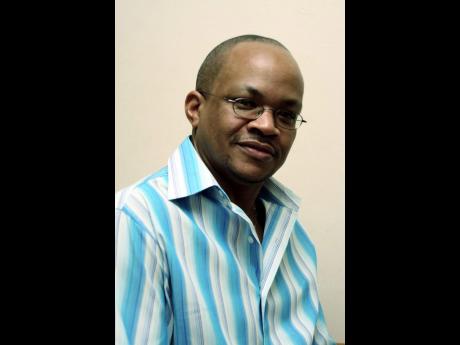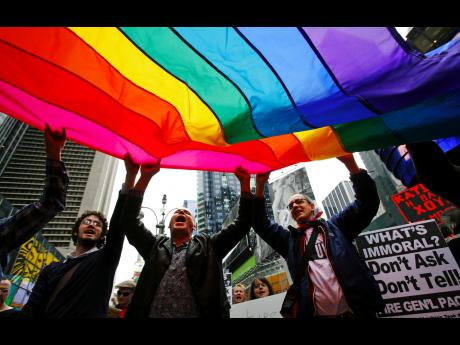Same-sex marriage...My evolving thoughts
If you had asked me about same-sex marriage 20 years ago, I would have laughed hysterically and told you to cut out the crap. The concept of 'man and husband' or 'woman and wife' was ludicrous and unacceptable to me, and was fit to be ridiculed.
At that time I knew few openly gay people, or people who at least declared themselves to be so to me. All the weddings that I attended involved brides and grooms, all the wedding cakes had a man and a woman atop them, and all the couples that I knew were straight. So, I was socialized to think that heterosexuality was the only acceptable sexual orientation.
It is now 2015, and in a recent landmark ruling, the Supreme Court in the United States of America has legalized same-sex marriage, the 18th country to do so, the first being the Netherlands in 2001. However, I now find myself celebrating this decision with fellow allies and members of the lesbian, gay, bisexual and transgender (LGBT) community. What made me transform from rubbishing same-sex marriage to being a supporter of it? On reviewing my shifting views, a multitude of reasons come to mind.
One is actually meeting not just gay people, but same-sex couples, and this has influenced me to empathize with them. Being a gynaecologist, I have repeatedly interfaced and bonded with members of the LGBT community, as over the past two decades, many lesbians have been under my care. I have taken advantage of my opportunities to engage them about their lives, and found that, like heterosexual women, they too desire and require companionship, intimacy and love. Observing some of them with their partners has humanized the concept of same-sex relationships for me, and during my observations, I have detected no significant differences between their relationships and those of my heterosexual patients.
Another factor is my responsibility as a physician to do all that I can to enhance the heath of my patients. According to the World Health Organization (WHO), the definition of health is “a complete state of physical, mental and social well-being, and not merely the absence of disease or infirmity.” Over the years, I have learnt to fully respect this holistic definition and apply it to my practice. Studies repeatedly show how marriage, a stable union at least, can positively affect one’s health, and gay people are apparently no exception.
I have also critically analysed some of the arguments used to dismiss gay marriage and found them to be illogical. For example, it is often said that the main reason for marriage is procreation and to start families. But there are many persons who get married who choose not to have children, or are simply unable to, and there are no vociferous objections to those unions.
As a matter of fact, some studies, including a very large one published in the United Kingdom in 2014, have found childless couples to be happier than those who are parents. Fears about homosexuality leading to the extinction of the human race are also ridiculous, as it is unlikely that queer folk will ever be in the majority, in addition to the fact that many gay people wish to reproduce, and do so.
Concerns about gay marriage leading us down a “slippery slope to accept paedophilia and bestiality” are also illogical, as minors and animals are unable to give consent. The argument that, traditionally, definitions of marriage have included a man and a woman, can also be challenged. Definitions do not have to be cast in stone, and often change over time, influenced by logic, reason, rational thinking, experience and research.
The argument forwarded by heterosexuals that same-sex marriage will make a mockery of the institution of marriage is laughable. After thousands of years, we heterosexuals still have not gotten it right. Our divorce rates are high, many of us are separated, domestic violence remains an issue, adultery is not uncommon, and neither are its sequelae, such as outside children, ‘jackets’ or the transmission of STIs to spouses.
It is difficult to see how same-sex marriage will result in more of a mockery than that which we straight people have produced. Also, the fears that gay marriage will cause the ‘breakdown of society’ can also be refuted by observing what has taken place in countries in which it has been legalized. Scrutiny of these societies will reveal that there has been no societal breakdown or decrease in the quality of life of their citizens.
There are, of course, rational concerns about gay marriage, especially regarding children raised in these unions. It is not unreasonable to assume that the ideal scenario in which to raise children is with a mother and a father within a stable unit. After all, it does take a man and a woman to produce a child, and there are gender differences between mothers and fathers, with each bringing something different to the table. But many successful persons have been products of single-parent households, and objective research has failed to irrefutably demonstrate that children raised by gay parents are worse off than those raised in heterosexual unions.
My observations have also led me to not label opponents of gay marriage as necessarily homophobic or hateful. Yes, there are bigots out there who harbour an intense dislike for homosexuality, but for many of us, we know no other type of marriage but straight unions, and with some of our cultural and religious beliefs, the concept of same-sex marriage is and will remain difficult to comprehend for a long time. As a matter of fact, even some members of the LGBT community do not support same-sex marriage, for a variety of reasons.
When the issue of same-sex marriage is raised, people often become fixated on sexual acts between persons of the same gender. But marriage, same-sex or otherwise, is about so much more than that. It is about love, companionship, commitment, validating a relationship, being able to receive benefits such as healthcare and facilitating other issues such as property ownership and inheritance. When I step back and assess these factors and the dynamics involved, I cannot, in good conscience, oppose validating the relationships of members of the LGBT community.
- Michael Abrahams is a gynaecologist and obstetrician, comedian and poet. Email feedback to columns@gleanerjm.com and michabe_1999@hotmail.com, or tweet @mikeyabrahams.


